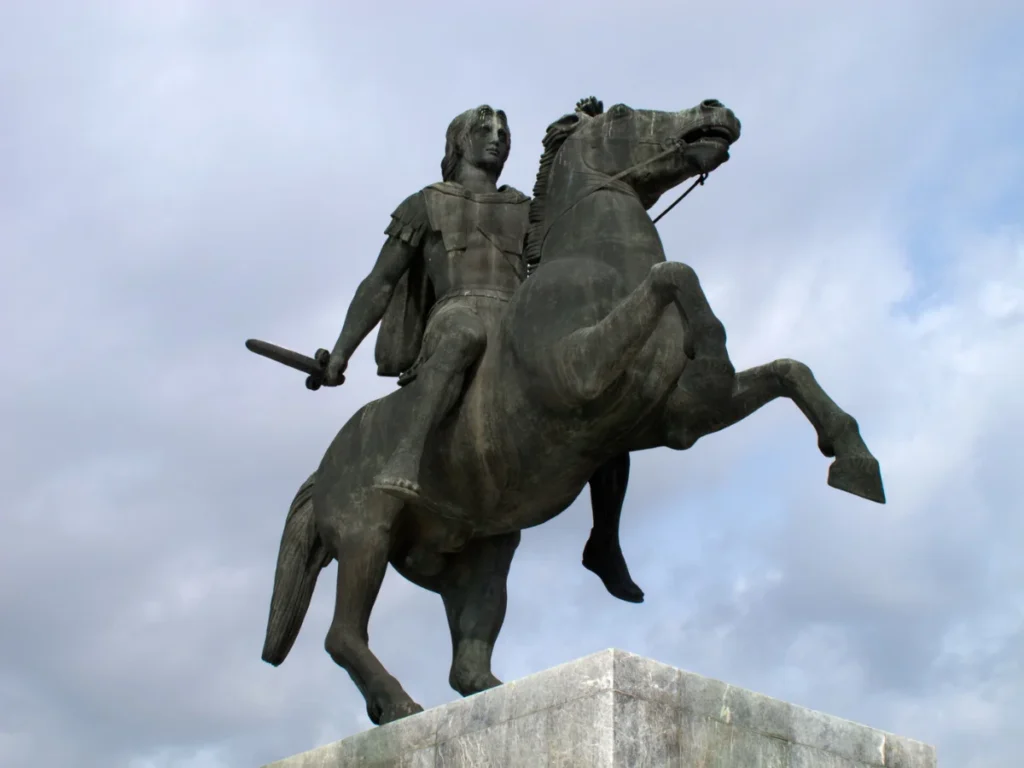Famous kings in Ancient Greece
There are many famous kings from Ancient Greece. Leonidas, a valiant warrior at Thermopylae, and Alexander the Great stand out. Pericles molded Athens into a democratic marvel, while King Minos governed enigmatic Crete. Agamemnon of Mycenae, a legendary figure in Greek mythology, was a formidable warrior and the cunning leader of the Greek forces during the Trojan War. Their leadership, visions, and adventures remain enduring sources of inspiration for generations.

The different city-states
In the labyrinth of city-states of ancient Greece, two mighty states – Athens and Sparta – stood tall, but each polis possessed its unique qualities and interests. Firstly, Athens, located in Attica, was known as the epicenter of civilization, where arts, science, and philosophy thrived. In contrast, Sparta in Laconia emphasized military discipline and might.
Moreover, while Athens developed a form of direct democracy, where citizens actively participated in governance, Sparta maintained an oligarchy ruled by a select few. Athenians, with their love for arts and culture, promoted public discourse in the Agora, while the Spartans, from an early age, underwent rigorous military training, making it the core of their existence.
Economically, Athens focused on trade, maritime ventures, and agriculture. They established an expansive trade network around the Mediterranean. On the other hand, Sparta primarily relied on agriculture, harnessing the labor of nearby helots.
Despite their distinct paths, the interests of Athens and Sparta frequently intersected. Intense rivalries flared, most notably during the Peloponnesian War. However, they weren’t always adversaries; against the Persian invasion, they united their forces, showcasing their capacity for collaboration in broader Greek interests.
Other states like Corinth, Thebes, and Argos also played crucial roles in ancient Greece’s political landscape. They had their alliances, interests, and conflicts, creating a tapestry of shifting loyalties and tensions across the Greek peninsula.
In conclusion, the relationships among the ancient Greek states were complex, marked by cooperation, competition, and conflict. Through this dynamic, these states shaped the trajectory of Western civilization, and their legacy continues to resonate today.
10 famous kings in Ancient Greece
Leonidas I of Sparta
Firstly, we have Leonidas I of Sparta. He’s best remembered for his valiant defense at Thermopylae against the Persian army. Under his leadership, 300 Spartans stood against thousands of Persians, symbolizing bravery and sacrifice.
Philip II of Macedon
Following him is Philip II of Macedon. He unified the warring Greek city-states and set the stage for his empire’s expansion. His son, Alexander, would later continue this conquest.
Minos of Crete
Fourth on the list is Minos of Crete. Legend holds that he ruled over the labyrinth housing the Minotaur. Minos’ reign marked the zenith of Crete in antiquity.
Agamemnon of Mycenae
Afterward, there’s Agamemnon of Mycenae. As the supreme commander of the Greek forces in the Trojan War, his determination and power stood as a pillar during this iconic conflict.
Solon of Athens
Then, we have Solon of Athens. As a distinguished statesman and poet, he enacted legislative reforms setting Athens on the path to democracy.
Lycurgus of Sparta
Subsequently, it’s Lycurgus of Sparta. Credited with establishing the stringent Spartan lifestyle and laws, his reforms birthed one of the most formidable military forces in ancient history.
Codrus, the last king of Athens
Eighth, stands Codrus, the last king of Athens. He’s known for his heroic self-sacrifice, giving his life to secure his city’s future.
Pausanias of Sparta
Then, we delve into Pausanias of Sparta. As one of Sparta’s kings, he played a pivotal role at the Battle of Plataea, ensuring Greek victory over the Persians, guarding Greek freedom and independence.
Alexander the Great
Lastly, no list would be complete without Alexander the Great. The son of Philip II, he’s famed for his unparalleled conquests, spanning from Greece through Asia. Under his rule, cultural exchange flourished, leading to the Hellenistic period that spread Greek culture and influence across three continents.
